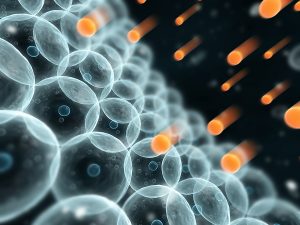The International Agency for Research on Cancer and the US National Toxicology Program have identified more than 100 environmental substances that cause cancer, like cigarette  smoke and air pollutants. Avoiding these carcinogens can be difficult so it’s important to take steps to reduce the risks that exposure carries.
smoke and air pollutants. Avoiding these carcinogens can be difficult so it’s important to take steps to reduce the risks that exposure carries.
A review published in last month’s issue of Topics in Current Chemistry looks at how a phytochemical found in broccoli helps protect us from these environmental carcinogens. The authors of the review are among the world’s leading experts in cancer, phytochemistry, and toxicology.
In a series of clinical trials conducted in China, they found that sulforaphane may protect us from airborne and foodborne toxins by switching on a cellular pathway that regulates cells’ abilities to protect themselves from environmental carcinogens.
Sulforaphane is the end product of a reaction between two chemicals produced in broccoli and other cruciferous vegetables that protect the plant from insect attack. When an insect (or a human) bites into the plant, the two chemicals come together to form sulforaphane. It is what gives broccoli its somewhat pungent flavor.
The researchers focused on how sulforaphane activates a cell-protective protein called Nrf2 for short (pronounced nerf 2). In doing so, sulforaphane induces cells’ antioxidant defense systems and programmed cell death. It also prevents tumors from developing their own blood supply—a crucial part of tumor survival.
Nrf2 is tethered to another protein called Keap1 (pronounced keep 1). These proteins stay together in the watery portion of the cell called the cytoplasm.
In the nucleus, there’s a DNA region containing genes that protect cells from the damage caused by carcinogens. One of the many effects of these genes includes the induction of a powerful enzyme that protects p53, a tumor suppressor protein that is often mutated in cancers. These genes also activate enzymes that serve as antioxidants.
Nrf2 is the missing link in switching on these genes. But Nrf2 can activate these genes only if it is released from its tether, Keap1. Sulforaphane induces Keap1-Nrf2 separation so that Nrf2 is free to travel to the nucleus to switch on the protective mechanisms.
One of the authors of the review, Jed Fahey, ScD, of Johns Hopkins University, said, “The sulforaphane found in broccoli is one of nature’s most potent inducers of Nrf2 signaling.”
This is just one of many reasons broccoli may play a role in reducing cancer risk. You can find out more about broccoli and other cruciferous vegetables in AICR’s Foods that Fight Cancer.
Teresa L. Johnson, MSPH, RD, is a nutrition and health communications consultant with a long-time interest in the intersection of nutrition, exercise, and wellness.





